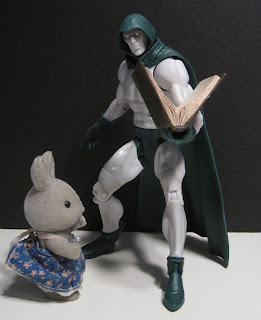A Canticle for Leibowitz
A Canticle for Leibowitz
Walter M. Miller, Jr., 1960
Hugo Winning Novel -1961
Premise: It's the future, and it is a dark time. After a catastrophe known as the Flame Deluge, civilization was crushed back to the Dark Ages. Almost literally, in fact, since the only group of people trying to preserve the knowledge of the past for a future generation is an order of monks. They are devoted to an engineer known as Saint Leibowitz, who was martyred in the defense of books. This book follows three different generations of the Order, and examines the world they struggle to survive in.
I really enjoyed large swaths of this novel, but in the end I didn't find it fully narratively satisfying. The novel was adapted from three short stories, and each section ends rather abruptly and doesn't connect as much to the others as I wish it did. The sections take place hundreds of years apart, so this is more a story of the sweep of history than of any one character.
The first two sections I found very interesting. I liked piecing together what had happened from the garbled history that the monks knew, for example in the first section poor Brother Francis feared the Demon called Fallout. The second section dealt with tension between a growing secular movement for knowledge and discovery and the preservation of fragments and books by the Order, as well as power struggles between the Church and secular rulers. There are moving questions raised about the value of just preserving the past, and what can be learned vs. what should be learned, and whether anyone can make that judgment. The book seems to offer no answers or firm opinions. The third section is less frightening than I imagine it was when it first came out, but it's fairly strong, although rather a lot of it is taken up with a debate about euthanasia.
The methods and motivations to preserve knowledge in a world that feared it reminded me a lot of its predecessor Fahrenheit 451.
A Canticle for Leibowitz definitely comes from the early post-apocalyptic tradition, in which humanity's self-destruction seems inevitable. The entire book is a futuristic replay of human history, and the sense of recurrence without end is very poetic, but not reassuring.
It's interesting to read, and I liked several of the characters, but I had issues with it, too. There is quite a bit of Latin in the text to ground it in the Catholic tradition, but there wasn't always translation, and that sometimes got annoying. As I said above, there were plot elements that seemed like they were going to be important, that instead never returned or the plot fizzled to nothing. The ending was, to my mind, rather foolish and dull. (Spoiler: Most of the end is taken up with a subplot about the Abbot believing a mutant woman is... something divine?) What was going on was unclear to me, and it didn't follow what had come before thematically or follow the more interesting plotline until the last two pages.
Most of this book is about people talking to each other. Sometimes angrily, sometimes nonsensically; action and warfare almost always takes place offstage or between sections.
After saying all that, I do want to restate that I found it an interesting book to read, and I'm glad I read it. The first two-thirds or so was good enough to redeem some of what came after.
3 Stars – A Good Book
List of Hugo Award Winners




Comments
Post a Comment
FYI: Most comments are moderated, and will not appear immediately.